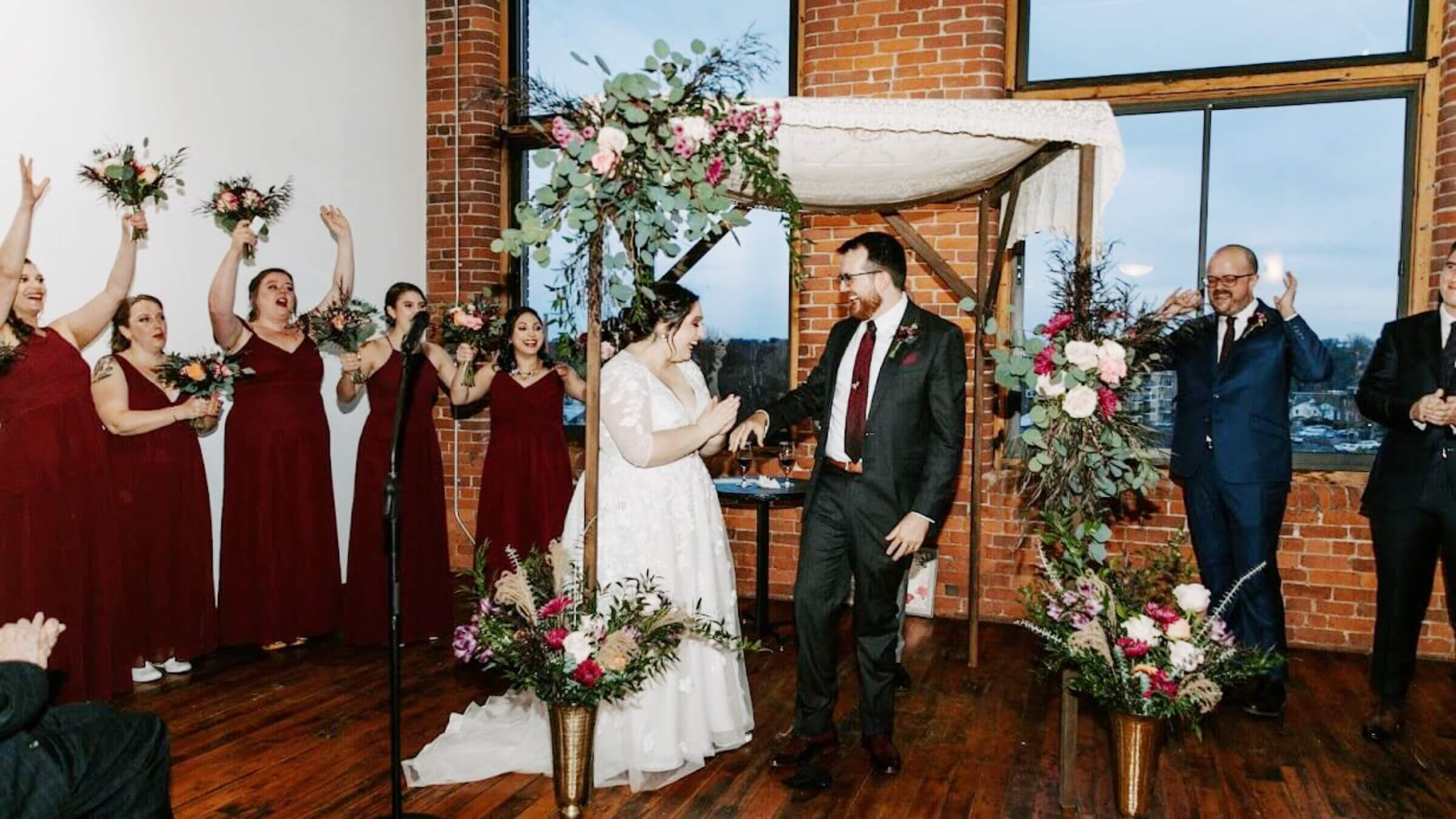Conservative movement’s ban on rabbis officiating at interfaith weddings will stand
The Rabbinical Assembly wants to help Conservative rabbis speak to interfaith couples, even if they can’t officiate their weddings

Graphic by Angelie Zaslavsky
Despite growing pressure on the Conservative movement to allow its rabbis to preside at weddings between Jews and non-Jews, the ban will remain — for now.
Leaders from the Rabbinical Assembly’s standards committee, which makes policy recommendations for the movement, conveyed as much to rabbis Wednesday in a closed webinar, a partial transcript of which was obtained by the Forward and verified by a rabbi who was on the call. Also left intact: the penalty of expulsion for rabbis who defy the 50-year-old prohibition.
But RA leaders also told rabbis on the call that it wants to help them lead productive conversations with interfaith couples prior to their weddings, even though they can’t officiate.
“Ultimately, we represent Jewish particularity, which means we might not necessarily in the end be the right person, but at least we will have helped everyone be more thoughtful about who we are and what’s going on here,” Rabbi Aaron Brusso, chair of the RA’s Standards Subcommittee, said in the webinar, according to the transcript.
On intermarriage, Conservative Judaism stands between Orthodoxy, where there is virtually no debate over the prohibition, and the Reform movement, the largest of the streams of Judaism, which has allowed rabbis to preside at intermarriages since the 1980s under certain conditions.
Representing 17% of American Jews overall, according to the 2020 Pew survey on American Jewry, membership in Conservative Judaism’s synagogues has shrunk markedly in recent decades. Some view the persisting ban as a sign that its leaders are refusing to change with the times and recognize that a large majority of non-Orthodox Jews marry non-Jews. The movement permitted its rabbis to marry same-gender couples in 2012.
“Today we reported out learnings from our strategic planning process,” Brusso said in a statement following a second webinar with the same agenda held Thursday. “It’s been a really thoughtful, participatory process. I’m proud of how our colleagues are holding responsibility for seeing and appreciating every human being and representing the particularity of Jewish tradition.”
Rabbi Harold Kravitz, president of the RA, sent a statement after this story was published. “Our Standards Committee thoughtfully moves us from framing this issue in a stark binary manner of yes or no,” Kravitz wrote. “Our work as a Rabbinical Assembly continues with a deliberative process that affirms the importance of our relationships to each other and to those whom we engage.”
An inevitable change?
Rabbi Daniel Horwitz, who attended the webinar, said he was pleased to see that the movement was not rushing into any changes.
“They’ve given a lot of thought not only to the issue of whether this is the right thing for us to be doing, but also some general things about counseling couples,” said Horwitz, of Houston’s Congregation Beth Yeshurun.
Some in the Conservative movement believe permitting its rabbis to officiate interfaith weddings is inevitable, a notion the RA has pushed back against, even as several rabbis have publicly left the movement over the ban and some, despite it, are officiating at interfaith weddings. One rabbi told the Forward earlier this year that his colleagues were doing so “under the radar left and right.”
But following the webinar, Horwitz felt reassured that the change would not be made anytime soon.
“I’m optimistic that it will not change not only in the short term, but in the long term,” he said.
Rabbi Jacob Blumenthal, the chief executive of the RA, said this spring that the intermarriage question sits at the top of the RA’s agenda and will be addressed at its next convention, in November in St. Louis.
A deep divide
Within the RA, which has 1,600 members globally, the deep philosophical divide on the issue is also a demographic and geographic one, splitting younger clergy from their elders and liberal American rabbis from their more conservative counterparts in Israel and around the world, many of whom see allowing interfaith weddings as a threat to their legitimacy.
As the ranks of Conservative rabbis who favor lifting the ban have grown, with some rabbis openly defying it, Rabbi Bill Siemers, of Congregation Beth Israel in Bangor, Maine, has used the standard, which was established in 1972, as a shield protecting him from officiating marriages he doesn’t think would be Jewishly valid.
He acknowledged, though, that the view was increasingly uncommon in the movement, and he was bracing himself for an official policy change. His younger colleagues and rabbinical students these days predominantly expect it to eventually be allowed — if not next week, then in a few years.
Any change in the rabbinate’s orientation on the issue would put him in an uncomfortable position next time he is asked to officiate an interfaith wedding.
“It’s going to redefine my reputation as a rabbi,” Siemers said, “and I’m going to have to deal with it.”

















